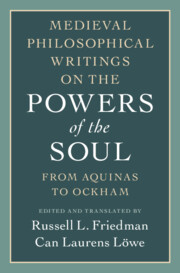Book contents
- Frontmatter
- Contents
- Acknowledgments
- Sources of the Translated Texts
- Notes on the Translations
- List of Abbreviations, Symbols, and Conventions
- Introduction:
- 1. Bonaventure (d. 1274), Commentary on the Sentences, book II, d. 24, a. 2, q. 1:
- 2. Albert the Great (d. 1280), Summa theologiae, book I, treatise 3, q. 15, chap. 2, a. 2, c. 1:
- 3. Thomas Aquinas (d. 1274), Commentary on the Sentences, book I, d. 3, q. 4, a. 2:
- 4. Henry of Ghent (d. 1293), Quodlibet III, q. 14 (excerpts):
- 5. Godfrey of Fontaines (d. ca. 1306), Quodlibet II, q. 4:
- 6. Thomas of Sutton (d. ca. 1315), Ordinary Question 4 (excerpts):
- 7. Peter of John Olivi (d. 1298), Questions on the Sentences, book II, q. 54 (excerpts):
- 8. John Duns Scotus (d. 1308), Commentary on the Sentences (Reportatio A), book II, d. 16:
- 9. James of Viterbo (d. 1308), Quodlibet I, q. 7, doubt 1:
- 10. Durand of St.-Pourçain (d. 1334), Commentary on the Sentences (Third Version), book I, d. 3, part 2, q. 2:
- 11. William Ockham (d. 1347), Commentary on the Sentences (Reportatio), book II, q. 20
- Glossary of Terms
- Glossary of Arguments
- Bibliography
- Index
6. - Thomas of Sutton (d. ca. 1315), Ordinary Question 4 (excerpts):
Do the Soul’s Powers Differ as Absolute Things from the Soul’s Essence?
Published online by Cambridge University Press: 10 April 2025
- Frontmatter
- Contents
- Acknowledgments
- Sources of the Translated Texts
- Notes on the Translations
- List of Abbreviations, Symbols, and Conventions
- Introduction:
- 1. Bonaventure (d. 1274), Commentary on the Sentences, book II, d. 24, a. 2, q. 1:
- 2. Albert the Great (d. 1280), Summa theologiae, book I, treatise 3, q. 15, chap. 2, a. 2, c. 1:
- 3. Thomas Aquinas (d. 1274), Commentary on the Sentences, book I, d. 3, q. 4, a. 2:
- 4. Henry of Ghent (d. 1293), Quodlibet III, q. 14 (excerpts):
- 5. Godfrey of Fontaines (d. ca. 1306), Quodlibet II, q. 4:
- 6. Thomas of Sutton (d. ca. 1315), Ordinary Question 4 (excerpts):
- 7. Peter of John Olivi (d. 1298), Questions on the Sentences, book II, q. 54 (excerpts):
- 8. John Duns Scotus (d. 1308), Commentary on the Sentences (Reportatio A), book II, d. 16:
- 9. James of Viterbo (d. 1308), Quodlibet I, q. 7, doubt 1:
- 10. Durand of St.-Pourçain (d. 1334), Commentary on the Sentences (Third Version), book I, d. 3, part 2, q. 2:
- 11. William Ockham (d. 1347), Commentary on the Sentences (Reportatio), book II, q. 20
- Glossary of Terms
- Glossary of Arguments
- Bibliography
- Index
Summary
In Ordinary Question 4, of which we have translated a large excerpt, Thomas of Sutton argues that the soul and its powers are distinct. Sutton’s strategy for defending the distinction theory is, roughly, two-pronged. First, Sutton develops his own conception of power and act. Second, he aims to show that Aquinas’ arguments for the distinction theory, in particular the Category Argument, are sound, despite objections to the contrary. Key to Sutton’s own conception of power and act are two ideas. The first is that a power is a kind of possibility. Specifically, a power is a possibility that remains when it is actualized. The second idea is that powers and acts are mutually exclusive kinds of being. No act is a power, and no power is an act. Since the soul is a kind of act according to the Aristotelian view, this entails, for Sutton, that the soul is not its powers. In this text, Sutton also seeks to rebut Henry’s regress argument against Aquinas. He argues that this argument is predicated on a mistaken conception of how necessary accidents or propria relate to their bearers.
Keywords
- Type
- Chapter
- Information
- Medieval Philosophical Writings on the Powers of the SoulFrom Aquinas to Ockham, pp. 104 - 121Publisher: Cambridge University PressPrint publication year: 2025

